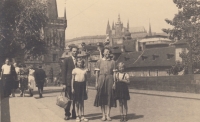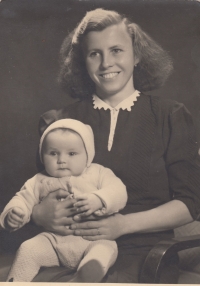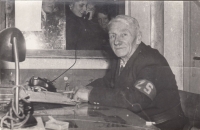"The Reconciliation Monument in Horní Teplice... I didn't experience it myself because I was born in 1948. But I was quite interested in it, and our son studied history and chose to live in Teplice from '39 until 1945, so that's where the wild expulsion was also reflected. First of all, I was looking for books in Germany, because there was nothing in the archives here about it, so I also learned a lot about it. I guess I could go on and on. But what I know and remember is that when my husband's mother, when they were murdered in Horní Teplice afterwards, and then they had to dig them up on Buk Mountain, exhume them and take them to Srbská, and they had to bury them there, my husband's mother was looking out the window here when they were being taken away on a ladder truck and horses. And 22 children died there on the Buk Mountain. There were children there! And these were the first to be withdrawn to Germany, actually from Poland. Well, there was a Czech woman among them, the mother of a little girl, and there it was a kind of personal revenge of finance Riedel. And he included a total of 22 people, including her, in that deportation. They were sent to Poland, but the Polish side refused them, so they came back and they had to dig themselves a hole on Buk Mountain, and then they shot them there. So I read that it was Mr. Svoboda and Mr. Riedl. And this Mr. Riedl, it was a kind of personal revenge on the lady, the Czech. And they, when they went to the transport afterwards, or when they were ready, she, the Czech woman, lived in Dolní Teplice. My father from Hronov came to see her because the Czech woman's husband was at the front, the war was on, and he wasn't at home. Dad came to visit her, and then when they started the wild expulsion, they took her away and left her daddy and the little girl here. She lost her life, and she was Czech, but as I say, it was a personal revenge of one of the financiers. The little girl was brought up by her grandparents in Hronov. Well, it's complicated, and there's more to tell. The girl's daddy and the husband of the executed girl never came back from the front. He stayed in Germany.
And then, as I mentioned, there was a trial in 1946, and that's where this Mr. Riedl, the financier with this Mr. Svoboda, had to confess. And they did convict them. And as I said, they had to exhume them and bury them properly. So they're buried in Srbská Street. And as it was wartime, they got this little condemnation, this 'scolding', but nothing happened to them."
















